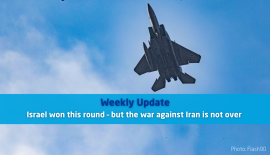Israel is experiencing turbulent times again
Israel is once again experiencing turbulent times with a wave of new attacks by Palestinian terrorists, rapidly changing relations with states in the Middle East, and changes in Syria that could affect the covert war between Israel and Iran.
The wave of new terrorist attacks that began on March 21, 2022, with an attack on civilians in the city of Beer Sheva reached its lowest point on May 5 when two Palestinian terrorists armed with axes and knives from the Jenin area murdered three Jewish men in the central town of Elad, Israel.
Jenin
It is no coincidence that a good number of the terrorists who now committed seven attacks in seven weeks came from the city of Jenin in northern Samaria.
Always a stronghold of extremists, Jenin was dubbed the capital of suicide terrorism during the Second Intifada because many terrorists who blew themselves up in buses, hotels, and restaurants came from the city and its suburbs.
The Israel Defense Forces (IDF) and Palestinian Authority security forces have always been wary of operating in Jenin, especially within the city’s refugee camp.
That, however, has changed since April after a terrorist from the Jenin area murdered three young Israelis on Tel Aviv’s busy Dizengoff Street.
Since then, the IDF has regularly raided Jenin and the refugee camp there while arresting dozens of suspects.
Hamas and the Temple Mount
Another factor in the current wave of terror attacks is the incitement by Hamas in Gaza.
Hamas leader Yahiya Sinwar recently delivered an inflammatory speech that was broadcasted by Quds TV in Gaza. During that speech, Sinwar called on Palestinian Arabs in Judea and Samaria to arm themselves, if necessary with axes and butcher knives, and then hunt for Jews who should then be murdered. Apparently, the two Elad terrorists were influenced by Sinwar’s incitement as they carried out their horrific attack with axes and knives.
Hamas has long incited the Palestinian masses over the alleged Israeli desecration of the Al-Aqsa mosque on the Temple Mount. Sinwar, in his fiery speech, threatened a religious war that would change “the face of the world and scorch the earth in the Middle East”.
He also threatened that Hamas would attack synagogues around the world.
Tensions around the Temple Mount peaked during Passover and the Islamic fasting month of Ramadan when hundreds of young Muslims attacked Israeli police daily from within the Al-Aqsa mosque. Police were eventually forced to enter the mosque in an attempt to bring the situation under control.
To keep things from getting completely out of hand, Jews then were banned from ascending the Temple Mount during the last ten days of Ramadan.
Tensions with Jordan
Relations with Jordan further deteriorated due to the tensions surrounding the Al-Aqsa mosque. The government in Amman blamed Israel for the riot and even summoned Israel’s ambassador to dress him down.
Jordan also demanded an increase in the number of guards of the so-called WAKF, the Islamic custodian of the Muslim holy sites on the Temple Mount.
Israel responded to this demand with ambivalence.
Prime Minister Naftali Bennett rejected the request but Omer Bar-Lev, his internal security minister, was in favor of expanding the WAQF in exchange for removing Hamas elements from within the organization.
Prime Minister Bennett, however, stuck to his rejection of the Jordanian demand, saying that only the Israeli government makes decisions about the Temple Mount.
Israel–Russia relationship under pressure
Then there is the situation in Syria where the Russian army is reducing its presence because of the war with Ukraine.
More on that later.
This war caused deterioration in relations between Israel and Russia after both Bennett and his Minister of Foreign Affairs, Yair Lapid strongly criticized the Russians.
Israel, in turn, was accused by a Kremlin spokesman of sending mercenaries to fight alongside the Ukrainian army, and the Jewish state was also accused of collaborating with the “Nazi regime in Kyiv”.
Sergei Lavrov, the Russian Foreign Minister then added fuel to the fire and made anti-Semitic remarks about President Volodymyr Zelensky’s Jewishness.
Lavrov also claimed that Jews are the biggest anti-Semites.
These comments provoked great anger in Israel and sharp condemnations from Lapid and Bennett.
Ultimately, Israeli fears that the crisis with Russia would limit freedom of action against Iran’s entrenchment in Syria didn’t materialize.
During Independence Day on May 5, President Vladimir Putin telephoned Bennett and apologized for Lavrov’s comments.
Putin also sent a congratulatory message on the 74th Independence Day to Israeli President Isaac Herzog.
With that, the crisis seemed to have come to an end.
Syria
Israel can thus continue its campaign against Iran in Syria and has recently launched repeated airstrikes against Iran- and Hezbollah-related targets in the war-torn country.
Syrian President Bashar al-Assad now seems less confident due to the declining Russian presence and Putin’s attitude towards Israel.
Assad is now seeking closer relations with Iran and in early May traveled to Tehran where he met with Supreme Leader Ayatollah Ali Khamenei and Iran’s extremist President Ibrahim Raisi.
Media in Iran later claimed that close relations between Damascus and Tehran had prevented “the Zionist regime’s dominance in the region”.
Positive developments
Meanwhile, Israel is helping displaced persons in Syria with a new technology that converts air into water.
The Israeli company Watergen has been producing a device for the past two years that converts moisture in the air into condensation and then into mineral-rich water.
The device runs on solar energy and was purchased by the Multi-faith Alliance for Syrian Refugees.
This Democratic-oriented organization bought dozens of water harvesting devices from Watergen and distributed them in refugee camps run by the Free Syrian Army (FSA) and the Syrian Democratic Forces (SDF) which is dominated by Kurds.
Another positive development is that the Abraham Accords between Israel, two Gulf States, and Morocco held up during the crisis on the Temple Mount.
The Arab countries didn’t choose Israel’s side during the conflict, however.
In addition, Turkey has made overtures to Israel after a long period of very poor relations.
President Recep Tayyip Erdogan is trying to restore relations with Israel amid the economic crisis in Turkey and Erdogan’s diminished popularity among the Turkish population.
Israel is reluctant watching Erdogan’s moves and apparently first wants to see actions against the presence of Hamas operatives in Turkey.






